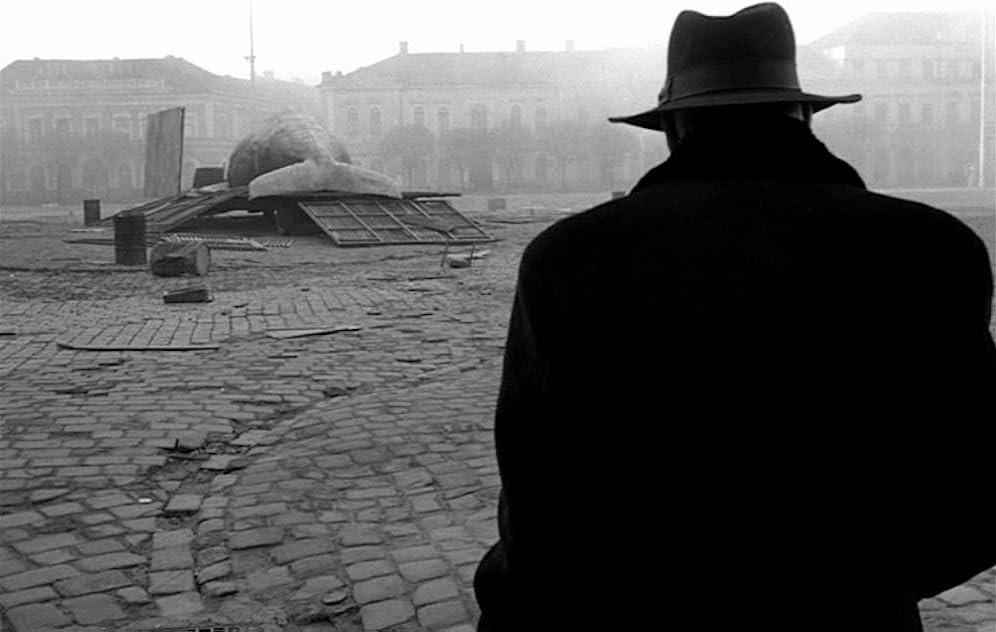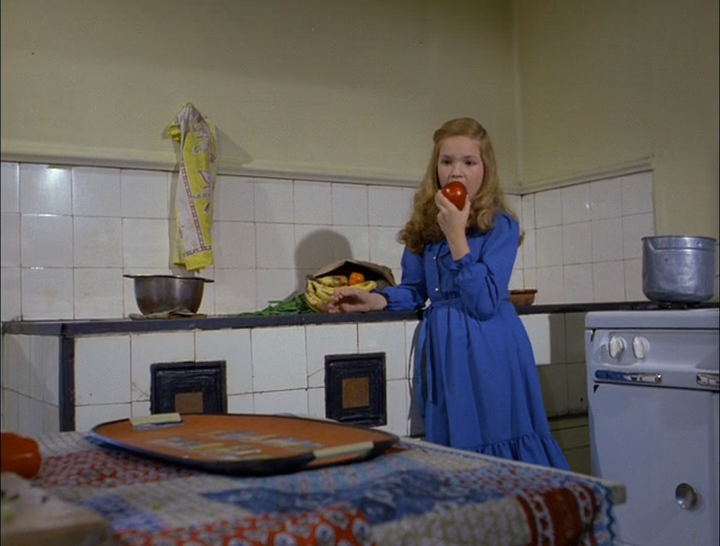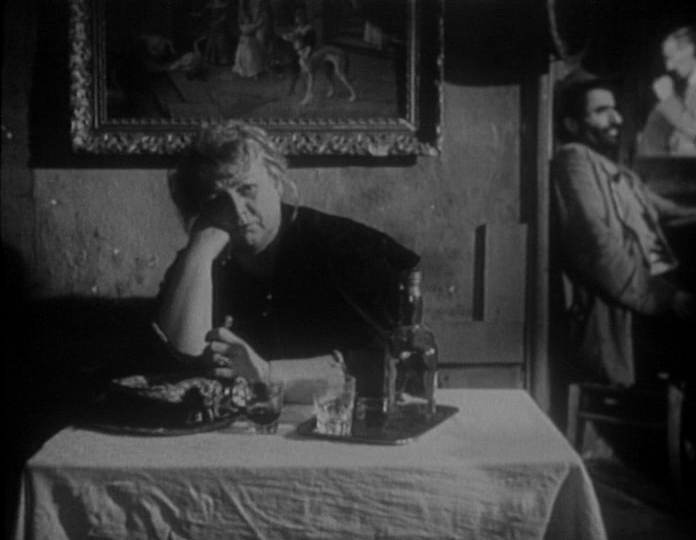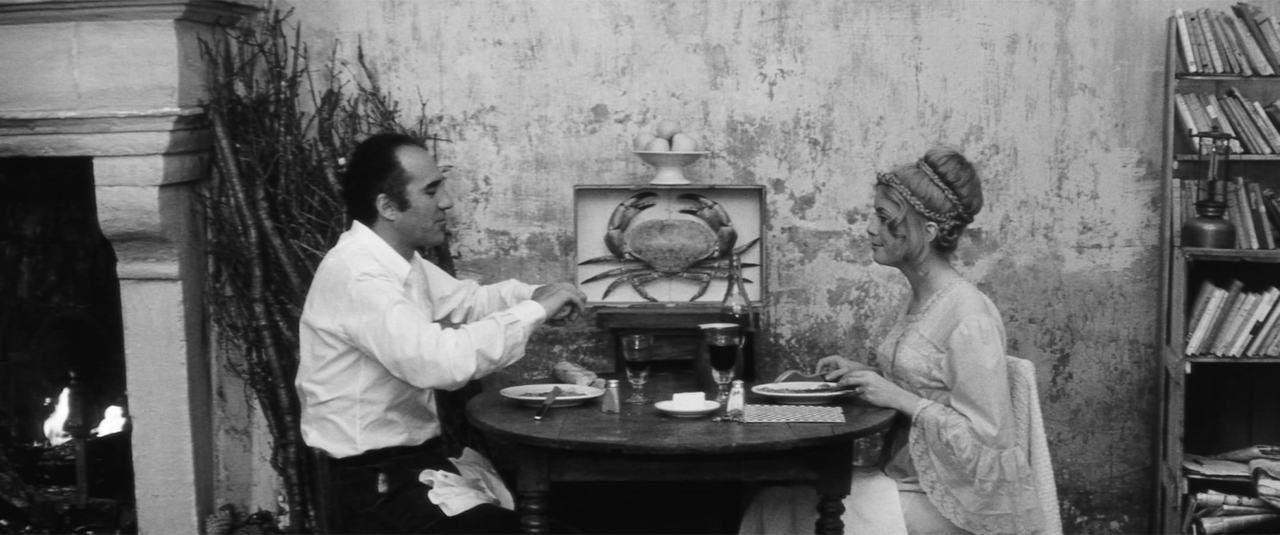“All I ask is that you step with me into the boundlessness, where constancy, quietude and peace, infinite emptiness reign.”Werckmeister harmóniák (Béla Tarr, 2000)
Sep
26
Shamu The Whale Day

A man in a dark hat and coat approaches the whale. The huge creature lays in an enormous open wooden crate in the middle of a town square. DPs: Patrick de Ranter, Miklós Gurbán, Erwin Lanzensberger, Gábor Medvigy, Emil Novák & Rob Tregenza.
– János Valuska
mystery
Orlacs Hände [Die unheimlichen Hände des Doktor Orlac / The Hands of Orlac] (Robert Wiene, 1924)
Sep
25

Paul Orlac (Conrad Veidt) stretched out on a wooden bench in a tavern. A strange man sits on a second bench on the other side of the table. DPs: Hans Androschin & Günther Krampf.
Veneno para las hadas [Poison for the Fairies] (Carlos Enrique Taboada, 1986)
Sep
19
apples

Verónica (Ana Patricia Rojo) eating a red apple from a paper bag filled with fruit. The kitchen is spartan. DP: Lupe García.
The Medium (Gian Carlo Menotti, 1951)
Sep
18

Madame Flora (Marie Powers) by herself at a small table in a shady bar. DP: Enzo Serafin.
– You want a leg or a breast? – You make the choice.To Catch a Thief (Alfred Hitchcock, 1955)
Sep
8
leg or breast

Francie (Grace Kelly) and John Robie (Cary Grant) taking a (lunch) break on the Grand Corniche coast road. DP: Robert Burks.
Homicidal (William Castle, 1961)
Sep
2
Ice cream (melting)

Emily (Joan Marshall), a stately blonde, looking down on a sulky little kid holding his slowly melting ice cream. DP: Burnett Guffey.
“And now I am going to demonstrate to you the power of your own mind.”The Hypnotic Eye (George Blair, 1960)
Aug
29
National Lemon Juice Day

Suave hypnotist Desmond (Jacques Bergerac) and his lovely assistant Justine (Allison Hayes) using the magic of vitamin C to demonstrate to you, the viewer, how hypnotism works. DP: Archie R. Dalzell.
The Hypnotic Eye utilises what's called the movie gimmick. This one doesn't deploy anything hugely spectacular, no Percepto! seat vibrators (The Tingler (1959)) or Witchcraft (1964) witch deflectors or even a trained nurse on standby. There's a balloon. No spoilers here
– Desmond
There are also multiple moments where hypnotist Desmond (handsome future-Revlon-exec Jacques Bergerac) directly addresses you, the (wo)man in the audience. Because you too may laugh at that folly, that gimmick, that parlour trick. But who says it isn't real? Who says you really never went to see a hypnotism show…?
“Do you want to work? What a nightmarish idea” Οι Τεμπέληδες της Εύφορης Κοιλάδας [Oi tembelides tis eforis koiladas / The Idlers of the Fertile Valley] (Nikos Panayotopoulos, 1978)
Aug
21
freebie: World Sleep Day

The maid, father, and two of the sons in a drab, dark green corridor. The men wear burgundy red dressing gowns over their pyjamas and lethargically lean instead of actively sit or stand. The maid wears practical everyday wear and has something to discuss. DP: Andreas Bellis.
Slow cinema of a different kind. We spend long hours in the company of a father (Vasilis Diamantopoulos) and his sons Sakis (George Dialegmenos), Nikos (Dimitris Poulikakos), and Giannis (Nikitas Tsakiroglou). The four of them – rich, bourgeois – have inherited a country villa and the plan is to do nothing for the next seven years. No work, no unnecessary movements. There's #sleep, lots of it. And copious amounts of food prepared by maid Sofia (Olga Karlatos) – she comes with the house; chattels personal – in addition of her body to be consumed by the increasingly idle men.
Οι Τεμπέληδες της Εύφορης Κοιλάδας is a slow satire, quietly addressing Greek #class struggle through the viewer's observation. Who do we follow? The father, who quickly surrenders to sloth; the sons – young, with their whole lives ahead of them; the maid – never questioning her position and slavishly fulfilling her duties of the flesh, in bed and in the kitchen?
The similarities are there but unlike Marco Ferreri's La grande bouffe (1973), there's no culmination in decadence. No euphoria to speak of. No grand release either; while the camera roams the mansion, attuned to #Mahler's tone poem Symphony No. 1 [Titan] – our only clue of the passing of time; even the vegetation succumbs to ennui – the story plods on. One of the men gets dressed, to go to work. It's foolish.
Maléfices [Where the Truth Lies] (Henri Decoin, 1962)
Aug
16
milk

Ronga (Maîthé Mansoura accompanied by cheetah Nyète), sits on a straw-covered floor while holding a bowl with milk. There are potted plants and gardening equipment is placed against the wall. DP: Marcel Grignon.
Les créatures [The Creatures] (Agnès Varda, 1966)
Aug
14

Edgar (Michel Piccoli) and Mylène (Catherine Deneuve) all dressed up for a home-cooked meal. On the wall behind them a huge framed mounted crab. DPs: Willy Kurant, William Lubtchansky & Jean Orjollet.